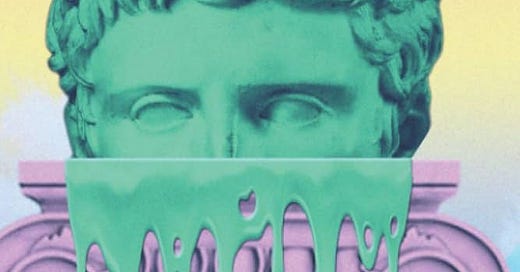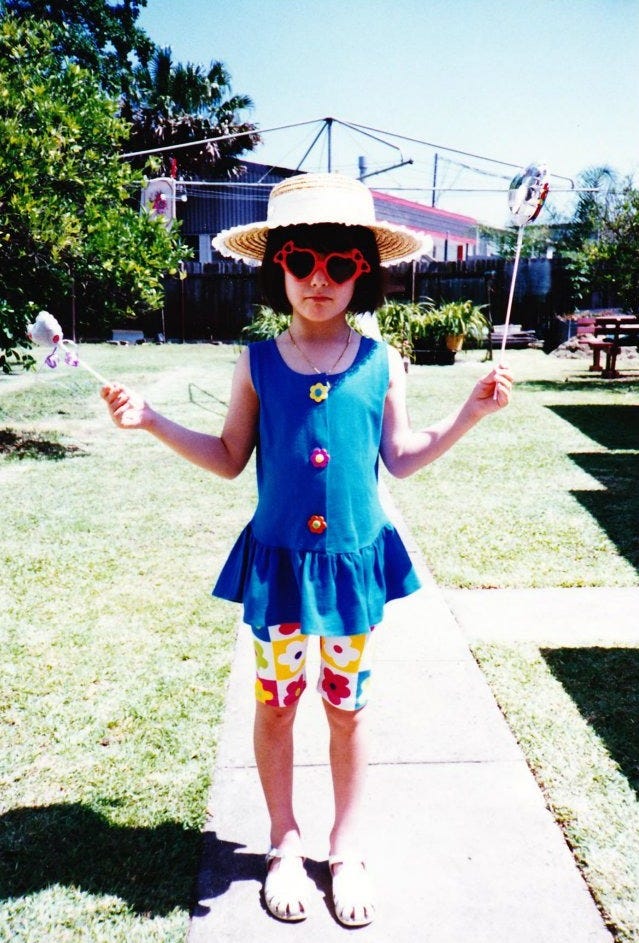When I first looked up the meaning of ‘melancholy’ in the dictionary, I was about nine, and I knew I’d found my word. A feeling of pensive sadness, typically with no obvious cause. Understanding and recognition clicked in my child-mind, yes. Yes. Here was the answer to my heart’s unarticulated question. I was melancholy. Born to be sad, baby!
Quite simply, I was a sad kid, often focused on something in the distance of my consciousness, always missing something. This isn’t just another sad girl Substack post; I’m not trying to cultivate an aesthetic here. This is an honest recollection. There was nothing fashionable about being a sad kid. I cried a lot. I wrote dark poems. I romanticised the past and brooded on the present. From a very young age, I ventured into long thought experiments about the lots of those less fortunate than me.
I may have worried some people around me, who looked for the cause. I can’t pinpoint the cause myself.
Was it just that I grew up autistic and undiagnosed, or that I had no father, or that I was an only, lonely kid, or that my single mother was more focused on our survival than with giving me attention every time I wanted it?
Did my extremely picky eating cause some kind of protein deficiency?
Was I just born thoughtful, with a creative temperament?
Or was I ultra sensitive to the world around me, aware that while I might have been safe and warm at any given moment, millions of others in the world were likely suffering?
Being sad used to feel like a problem I had to solve, to pathologize. In my twenties I wondered if maybe I had depression. But was it depression, when I could still get out of bed and work and love and have fun? The more I’ve learned about the world, the more I believe that some degree of sadness is logical. Is it not bizarre to enjoy an easy, unexamined life while other people, at the exact same moment you’re skipping through fields of tulips, are being bombed and killed and subjected to torture in different locations? Is it not impossible to even buy groceries in a globalised capitalist system without, somewhere along the chain of supply, indirectly stiffing someone out of a good living, without indirectly hurting someone? I’ve ordered products from Amazon and Temu. I own an iPhone, for Christ’s sake. I am an agent of others’ pain. My sadness has guided me to choose more moral actions, to clean up my side of the street.
I’ve come to terms with my sadness now. I am happy with where I am in life. In fact, I am happier than I’ve ever been, safe, loved, in a warm intimate relationship, and with caring close friends. I have problems and worries, but in general I have so, so, so, so much to be grateful for.
Yet I relish the times when I get to be alone, to be gloriously sad without having to explain myself to anyone. There is always much to cry about, and when I cry, I feel alive, two hot great waterfalls melting over my thirsty face and sometimes my neck and chest, washing me clean. It is primal. I often feel refreshed, vulnerable and open after a good cry. Sadness is a base emotion, and it lurks beneath more caustic feelings. I believe that time spent giving attention to sadness helps prevent it from congealing into anger, resentment, depression and malice.
The starving, suffering artist is a stereotype. I don’t believe that I have to be poor or surrounded by dramatic situations in order to create. But there may be something to it; if I wasn’t sad, if I didn’t have access to that critical, seminal human emotion, I don’t know if I would write half the amount that I do.
My sadness is only a problem when I have to share it with others, when they look upon me in horror. I’m sorry for them in those moments. I’m not really sorry for me. Sadness makes life’s joyful moments and unhinged laughter even more precious. Being sad is a part of being who I am. If people who are happy all the time exist, good for them, but I find it hard to believe they’re not living in some kind of frenzied denial of reality.
Sadness is the realisation of time passing. Sadness is the awareness that everything is temporary. Sadness is an acknowledgement of contrast. Sadness is facing reality as it is.
I like being happy. But I think I like being sad a little bit more.






